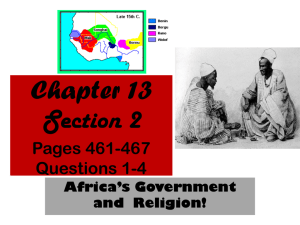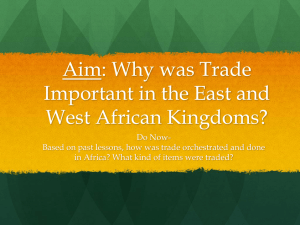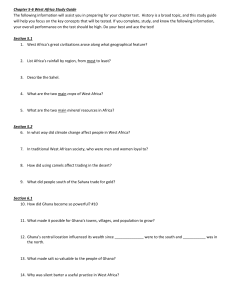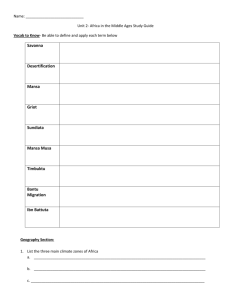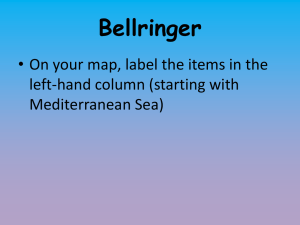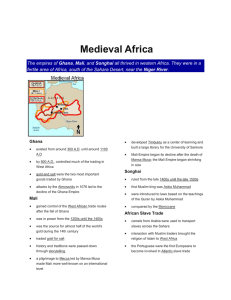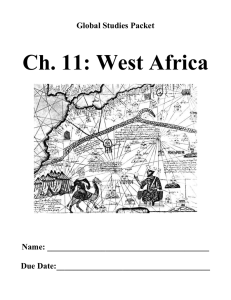Chapter 2 Section 2
advertisement
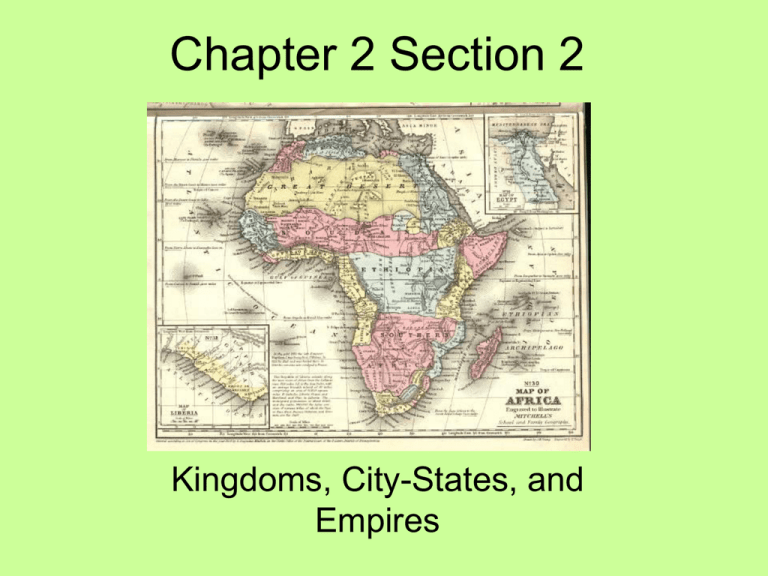
Chapter 2 Section 2 Kingdoms, City-States, and Empires East African Trading Civilizations • Grew strong from trade • Developed on or near coastlines • Aksum was a major trading kingdom on the east coast by C 200 AD Aksum People Becoming Christians Aksum is located in East Africa Cities of Trade • Aksum declined, but new trading cities arose. • Traded with India and China • Used prevailing winds to sail Cotton & Silk Were Traded Traders Brought Change • The religion of Islam was introduced • A new language called Swahili developed in the area • Swahili is a Bantu language which includes some Arab words African Languages Rise of City-States • Trading cities grew into powerful citystates • A city-state has its own traditions, government and laws • A city-state controlled much of the surrounding land Powerful City-States Great Zimbabwe Malindi Mombasa Fort Jesus Kilwa • A famous East African city-state around the 1300’s • Grew rich from trade and taxes • Like other East African city-states it was conquered by Portugal Southern & East African Trade Ties • Great Zimbabwe lay to the south & west of the East African citystates • It was connected to the trade routes by the Indian Ocean • Only ruins remain North African Trading Ties • Long Mediterranean coastline attracted traders • Around 1000 BC Phoenicians began searching for ports on North Africa The Rise of Carthage • Around 800 BC the Phoenicians established the city of Carthage • Grew rich from trade in textiles, metals, slaves and food products The Fall of Carthage • Wealthiest city in the world at this time • Controlled Mediterranean from the late 500’s BC through the 200’s BC • In 146 BC Carthage fell to Rome Roman Influences • North Africa fell under the influence of the Roman Empire • Christianity spread and Roman roads were built • ports flourished Islamic Influences • When Rome fell in 476 AD, North Africa fell under Arab control • Many North Africans became Muslims Muslims Praying West African Kingdoms • West African kingdoms grew rich on trade in salt and gold • West Africans had gold which they traded to North Africans for salt. • Ghana, Mali & Songhai grew rich from trade Gold Salt Ghana Located between the Senegal and Niger rivers. Was able to control trade across West Africa. Ghana’s Kings • Ghana’s kings grew rich from the taxes they charged on the salt, gold, and other goods that flowed through their lands. Mali • In the mid 1200’s the kingdom of Mali arose • Ghana lost control of its trade routes to Mali • In Mali the king was called “Mansa” which means “Emperor” Mansa Musa • Gained the throne about 1312 • Rules for 20 years and brought peace and order to the kingdom Mansa Musa & the Spread of Islam • Mansa Musa and many of his subjects were Muslim • He based his laws on the teachings of Islam • In 1324 made a pilgrimage to Mecca Mansa Musa’s Pilgrimage • He took 60,000 people with him • 80 camels carried 300 pounds of gold! • Gold was given away as gifts along the way • Mali’s reputation spread Mecca The Kaaba ( black stone in the corner) Songhai • Mansa Musa dies in 1332 • The Songhai empire became West Africa’s most powerful kingdom • Wealthiest Songhai trading city was Tombouctou Tombouctou Tombouctou, on the Niger river, was considered a great Muslim learning center. Forest Kingdoms • • • • Found in the forested region of West Africa Benin arose in the late 1200’s Traded in ivory, palm oil, and pepper They were masters at sculpting and carving in ivory, bronze, brass and wood. Forested Kingdoms Sculptures and carvings from Benin Location is Everything! • Located on the coast • Benin traded with other African kingdoms and with Europeans arriving by sea • In the 1500’s Europeans began trading guns for slaves The Middle Passage (Slaves crammed on ships for transport to the new world) Slaves were often beaten if they tried to run away!

